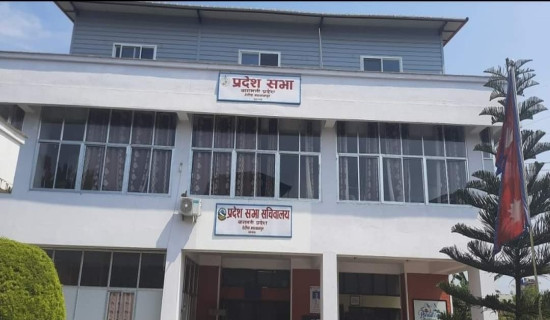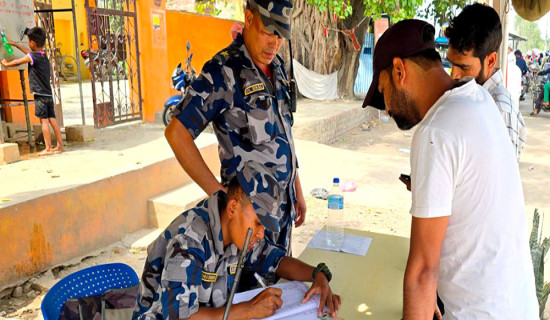- Sunday, 11 May 2025
Annual Programmes Must Address People’s Needs
President Ram Chandra Paudel recently presented the government’s annual Policy and programmes for the fiscal year 2023/24 while addressing a joint meeting of both the houses of federal parliament.
Based on this policy document, the government’s budget will be allocated. As usual, the plans prepared by governments look somewhat appealing to people in certain areas, ambitious in other aspects, repetition of previous years in many cases. Some of the highlights of this year’s annual programmes include regulation of microfinance companies and cooperatives; prioritisation of development aids; reopening of closed industries; branding of Nepali products; focus on electric vehicles; opening new mountains for climbing; Nijgadh airport plan; regulations on ride-sharing; relocation of landless squatters; electricity to all within next two years; no to plastics; restructuring of universities and colleges; merger of Nepal Television and Radio Nepal; voting rights for migrant workers; property investigation among high ranking officials and upgrading of cricket grounds.
Extra attention
While looking at the abovementioned salient features that leap out from the plan it will not be an exaggeration to say that while implementing the plan, extra attention needs to be paid to make sure strategies and implementations meet the needs of the people and the country. Microfinance is to provide financial services to the poor and has become a tool to provide external finance mainly to poor women who make more than 90 per cent of the clientele. Unfortunately, microfinance has become an industry to serve those who implement it. Therefore, while regulating the sector, it is important to make sure the needs of the poor women who are the clientele are addressed. Microfinance industry and government policies were successful in making women the focus and MF industry as a tool of poverty eradication. However, women have not become the owners and managers. This is just one example of how government plans fail and how after failure there is an attempt to try to resolve issues that come out of improper planning.
While addressing plans and policies the government has to make sure that they are properly designed and implemented so that they benefit the target group and ultimately the whole country. Issues of landless squatters and migrant workers are far above voting during elections. A long-term solution to their issues will help them have a sustainable livelihood. Closure of industries within the country has been an issue that this government has carried over this year too from last year. Now it is to be seen how these industries will be reopened so that jobs are created for the unemployed youths.
Tourism products and natural and human resources are all wealth of Nepal. So, it is important to plan properly on how to utilise them. However, while making plans it is important to make sure the activities are focused around people, planet and profit so that we address the needs of the people, the environment and also move towards sustainability. Addressing the climate issues is a priority of the government. Therefore, rather than re-planning the construction of yet another airport, there is a need to move towards electric railways connecting with neighbouring countries and building bicycle tracks within cities.
The Nepal government always has strategies within its annual planning to address women’s empowerment and social inclusion. Women’s empowerment and social inclusion cannot be achieved by just one intervention. Building social capital with economic empowerment needs to be encompassed by an overall protection component where women, children and all excluded population are ensured safety. Time has come for a paradigm shift where global and national policies need to be scrutinised to ensure the rights of the most vulnerable and marginalised communities. Has this annual plan done that?
Access to resources and stable property rights is highly gendered in many parts of the world. Women and girls in particular suffer from inequitable land rights and experience restricted access to resources and inheritance. Boys and men can also be denied access, such as when the first son inherits more than the second or third son. Rights to resources may also affect ability to access other resources or services. For example, a woman’s lack of land ownership or rights may inhibit her ability to access credit, as land is often used as collateral. Achieving more equitable access to resources offers significant opportunities both for economic growth and women’s empowerment. So has the government looked into these strategies while planning for landless squatters’ issues?
Women empowerment
One point of emphasis in every annual plan of Nepal government is the zero tolerance approach to gender based violence. Empowering women and challenging traditional socio cultural, or religious roles could lead towards domestic and other forms of violence. Therefore, designing programmes for women should not consider only one aspect. A holistic approach of moving towards their wellbeing with protection in the centre in a rights based approach should be the core emphasis. A lack of such insights while designing projects can move towards achieving certain indicators of women’s empowerment but lack the core need for safety and protection. Has Nepal government looked into this?
After the emerging of fake Bhutanese refugee episode, the people are astounded with the fact that some of the most powerful people entrusted with Nepali people’s rights could be involved in human trafficking and fraud. There is now a continuous pressure in the parliament sessions and on the streets to make sure this corruption scandal is addressed properly. While presenting the annual plan, the President mentioned that the government would have a zero tolerance policy on corruption. Is there a proper strategy to implement this?
(Namrata Sharma is a journalist and women rights. namrata1964@yahoo.com Twitter handle: @NamrataSharmaP.)
















